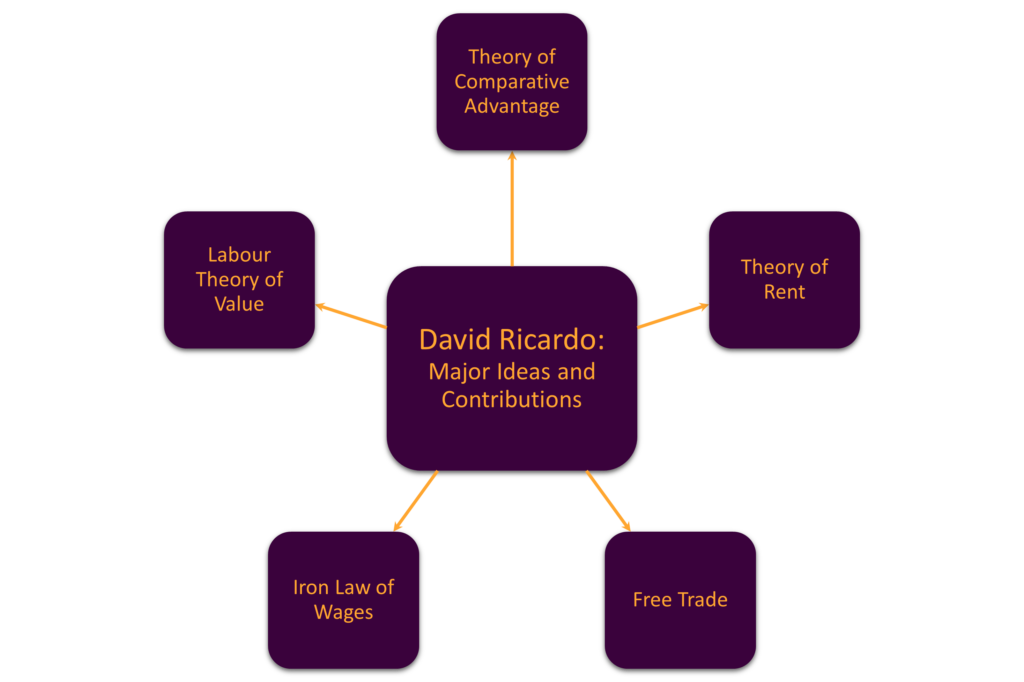The British Economist David Ricardo made significant contributions to Classical Economics in the late 18th century and early 19th century. His work related to economic theory is discussed, studied and debated even today. He is best known for his ideas on comparative advantage, labour theory of value and rent theory. In this post, we will focus on the life and contributions made by David Ricardo to the field of economics.
Econometrics Tutorials with Certificates
the life of David Ricardo
Family and Background
David Ricardo was born on April 18, 1772, in London. He was born into a Jewish family and was the third child out of seventeen. His father, Abraham Ricardo, was a successful stockbroker who had immigrated to England. Because their family was Jewish, they faced some discrimination in England. This is evident from the fact that David was not allowed to attend a university or join certain clubs because of his religion. Still, their family was well respected in the business community.
David married Priscilla Anne Wilkinson in 1793. The couple had eight children together. Priscilla was the daughter of a Quaker merchant and she outlived David by many years. David’s elder brother Moses Ricardo was also a successful businessman and was closely involved with their family’s stockbroking business. Among his siblings, Abraham Ricardo Jr. was a philanthropist and a prominent physician.
Occupations
David Ricardo held several occupations during his lifetime. Some of his most important occupations were:
- Stockbroker: David started his career as a stockbroker in his family’s firm. He was able to accumulate a fortune in this field and was very successful.
- Investor: Besides being a stockbroker, he was also an investor. His investments in Government bonds, Railway shares and Mining stocks earned him a considerable fortune.
- Economist: he made important contributions to the field of economics even though he did not receive any formal education in economics. He wrote several important books and papers related to economic theory.
- Landowner: in the later stages of his life, he purchased an estate in Gloucestershire. He also spent much of his time in local politics after this.
- Member of Parliament: David represented the borough of Portarlington as a Member of Parliament. He was elected in 1819 and remained in office till his death in 1823.
Major publications by David Ricardo
- “On the Principles of Political Economy and Taxation” (1817): this book expressed his views on economics and economic theory. His most important theories such as the comparative advantage theory, labour theory value and rent theory were discussed in this book.
- “The High Price of Bullion, a Proof of the Depreciation of Bank Notes” (1810): this pamphlet talked about the high prices of gold and silver. David argued that this was caused by overissuing of bank notes which resulted in the depreciation of the currency.
- “Proposals for an Economical and Secure Currency” (1816): Ricardo advocated in the favour of adopting a Gold standard in order to prevent inflation and stabilize the currency.
- “On Protection to Agriculture” (1822): this essay advocated for free trade in agriculture and argued against government protection in agriculture.
- “Notes on Malthus’s ‘Principles of Political Economy’” (1820): these notes by Ricardo were a critique of Thomas Malthus’ theory of populations. He stated that it was not a significant factor in determining the price of goods.
- “On the Principles of Currency and Exchange” (1816): Ricardo expressed his views on adopting a fixed exchange rate system to promote international trade.
- “Essay on the Funding System” (1820): this essay was a critique of the British government’s practice of funding wars through debt. He argued that this led to inflation and financial instability.
- “An Essay on the Influence of a Low Price of Corn on the Profits of Stock” (1815)
- “Plan for the Establishment of a National Bank” (1824): this pamphlet was published after Ricardo’s death. He proposed the formation of a National Bank that would issue currency backed by Gold.
Major Ideas and contributions

Theory of Comparative Advantage
The Comparative Advantage theory is Ricardo’s most famous contribution to economic thought. It focuses on international trade and states that a country can benefit from specialization and trade even when it has an advantage over another country in producing all goods. Even when a country has an absolute advantage in the production of goods, two countries can still benefit from trade if they produce a good in which they have a comparative advantage. The comparative advantage here implies the good that a country can produce at a lower opportunity cost.
For instance, let us assume that England has an absolute advantage over France in producing both Cloth and Sugar. It means that England can produce cloth and wine more efficiently than France. But, the opportunity cost of producing Sugar is higher in England as compared to France. In such a situation, it is beneficial for England to specialise in Cloth production and trade for Sugar from France. Similarly, France can benefit by specialising in the production of Sugar and importing Cloth from England.
Hence, countries can gain from international trade and specialisation if they produce goods based on their comparative advantage. This will also lead to higher efficiency and output in the countries.
Labour Theory of Value
According to Ricardo, the amount of labour employed to produce a good determines its value. It does not depend on the utility or demand of the product. This was based on the idea that labour is the ultimate source of value. The labour inputs used to produce a good are the sole source of value of a good.
Ricardo’s labour theory played a huge role in the development of Classical Economics. However, this theory received heavy criticism. The major reason for criticism was that the theory completely ignored the role of capital and other factors of production.
Theory of Rent
Ricardo argued that the value of land is determined by the amount of rent it can generate. The operation of diminishing returns and the scarcity of land dictated the amount of rent. He considered this rent to be a surplus payment to the landlords and it determined the value of the land.
Ricardo believed that more and more land will be brought into cultivation with a rise in population over time. However, diminishing returns will operate and each additional unit of land will have lower productivity as compared to the previous unit. Due to this, the overall rent paid to landlords will go on increasing. This will eventually lead to a transfer of wealth from tenants to landlords.
Iron Law of Wages
The Iron Law of Wages was based on the idea of the Population trap by Thomas Malthus. Ricardo believed that wages will always stay just high enough to ensure the subsistence of workers. When the wages increase, the workers will be able to afford larger families. This will lead to an increase in population as advocated by Malthus. This increase in population will drive wages back to the subsistence level.
Hence, Ricardo thought that any gains in wages will always be offset by increasing population and competition among workers.
Free Trade
David Ricardo was strictly against the idea of government intervention in the economy. He was a strong advocate of free trade among countries. This was largely based on his theory of comparative advantage where he emphasized the importance of specialisation and trade.
He argued that tariffs and other protectionist policies prevent specialisation and countries are unable to gain the benefits of trade. Countries can realise higher efficiency and output with free trade and specialisation based on comparative advantage. Moreover, he believed that free trade promoted peace and led to better cooperation between countries.
legacy
David Ricardo’s theories and contributions have had a lasting impact on the field of economics. His ideas on comparative advantage and free trade continue to be influential in debates about globalization and international trade. His labour theory of value and rent theory has also had a significant impact on economic thought and has been the subject of much debate and discussion over the years. Various famous quotes by Ricardo also give an insight into his thinking and ideas.
Ricardo’s influence can be seen in the work of later economists such as Karl Marx, who built on his labour theory of value to develop his own theory of capitalist exploitation. David Ricardo’s work also influenced John Stuart Mill, another influential economist, who incorporated many of his ideas into his own work.
In addition to his contributions to economics, Ricardo was also an influential political figure. He was a Member of Parliament and was active in political debates of his time, particularly on issues related to free trade and economic policy.
Related Categories
Econometrics Tutorials with Certificates
This website contains affiliate links. When you make a purchase through these links, we may earn a commission at no additional cost to you.


